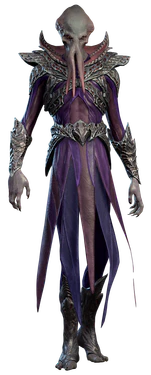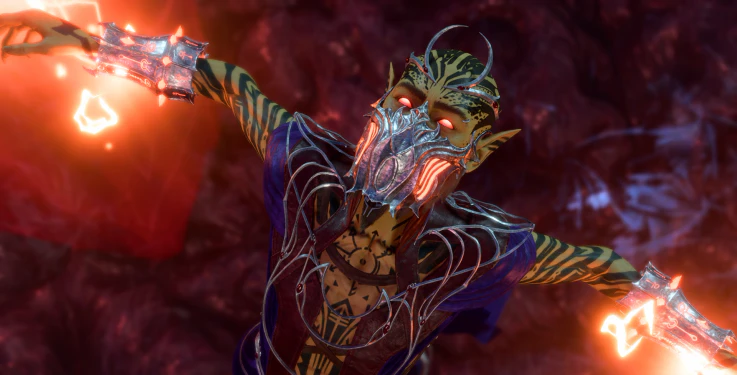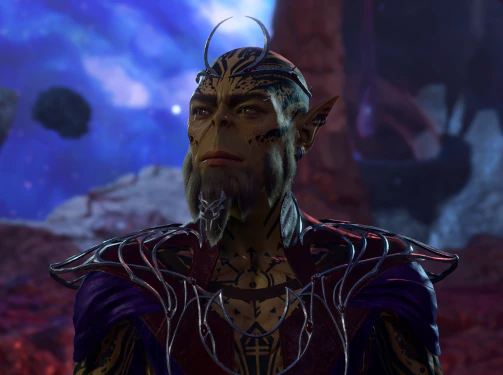Ad placeholder
Orpheus
| Overview | Combat |
Orpheus is a Githyanki that appears in Baldur's Gate 3, playing a central role in Act Three and Lae'zel's personal quest, The Githyanki Warrior. As the son of Gith herself, he acts as the supposed true ruler of the Gith Empire. However, he has been captured and imprisoned in the Astral Plane by Vlaakith. Being a githyanki, he seeks to destroy the mind flayers, and as the githyanki prince, he strives to remove Vlaakith from power.
Overview[edit section | visual editor]
Background[edit section | visual editor]
According to the inscribed discs, banned and deemed heretical by followers of Vlaakith, Orpheus is the first and only son of Mother Gith, the leader of the rebellion that freed the races that would bear her name from the Illithid Empire. Gith's impressive psionic power allowed her to disrupt elder brain control, a power that her son inherited. At some point during the rebellion, Gith's advisor, Vlaakith, made a deal with the dragon goddess , in which the gith and red dragons became eternal allies, and a small contingent of red dragons would serve the gith as steeds. It was only after the split between the githyanki and githzerai that the cost of Vlaakith's deal was revealed, as Gith was summoned to the Nine Hells and never returned. Tiamat's red dragon consort, , came to the githyanki and decreed that Vlaakith was to be their new ruler.
Outraged at this turn of events, Orpheus led a rebellion against Vlaakith I's rule, assembling an honour guard and declaring himself the rightful ruler of the githyanki. This "War of the Comet" was said to have ended with Orpheus' death at the hands of Kith'rak Voss, with Ephelomon devouring his corpse.[2] In truth, Orpheus and his honour guard were imprisoned in a corner of the Astral Plane accessed using the Astral Prism. Orpheus himself was restrained by infernal chains, so that Vlaakith could exploit his elder brain disruption powers. The fact that Orpheus still lived was known only to Voss, the current and past Vlaakiths, and a few secret devotees of the Prince of the Comet throughout githyanki society.
The artefact containing Orpheus soon came to the attention of The Netherbrain, who wanted to use it to overthrow the Chosen of the Dead Three in control of it. It sent a team of illithids to find and take the artefact from the githyanki. However, the leader of the group (a mind flayer known as The Emperor) seized the opportunity and went rogue, taking the artefact and hoping to use it to overthrow the elder brain.
Involvement[edit section | visual editor]
Act One & Act Two[edit section | visual editor]
Orpheus – and his role in the greater story of Baldur's Gate 3 – is hinted at throughout the game, but not truly revealed until the beginning of Act Three. Notably, he is referenced in the "Orpheus, Prince of the Comet" series of discs, which recount his attempted rebellion against the first Vlaakith and form the backbone of the quest Discover the History of Prince Orpheus.
Act Three[edit section | visual editor]
Battle in the Astral Prism[edit section | visual editor]
While resting at Wyrm's Lookout, the party are ambushed by githyanki warriors. The Dream Guardian opens a portal into the Astral Prism for the party to enter, lest they fall under the Absolute's influence. There, the Dream Guardian reveals their true form as a mind flayer free from hivemind control, and asks the party for their aid against the githyanki, which starts Help Your Protector. Though there is an option to attack the mind flayer, this leads to a Game Over, as the player character and all party members fall under the control of the Absolute or are killed by the githyanki. After the battle, the Dream Guardian reveals that the source of the party's protection is the imprisoned Orpheus, and the githyanki who attacked are his honour guard, imprisoned alongside him by the first Vlaakith. Completing this encounter completes both Discover the History of Prince Orpheus and Discover the Artefact's Secrets; it also starts Free Orpheus.
Acquiring the Orphic Hammer[edit section | visual editor]
While visiting the party's camp in Act Two, Kith'rak Voss directs the party to meet him at Sharess' Caress in Wyrm's Crossing. Upstairs, in the Devil's Den, he can be found attempting to make a deal with the devil Raphael, who eventually dismisses him. Talking to the devil reveals he has the Orphic Hammer, a magical hammer with the ability to free Orpheus from his infernal chains. This starts Deal with the Devil. He promises to give the artefact to the party in exchange for the Crown of Karsus, signing a Soul-Sworn Contract with the player character if they accept. There are four main paths here:
- The player character refuses the deal but chooses to acquire the Orphic Hammer anyway. The party must infiltrate the House of Hope to steal the Orphic Hammer. This leads to a fight against Raphael.
- The player character accepts the deal, starting both Escape the Deal and Fulfill the Deal, and does not betray Raphael. Before the final battle, when trying to free Orpheus, Raphael appears and hands over the Orphic Hammer. As his deal involves the party giving up the Crown of Karsus, this prevents Gale from either giving the crown to Mystra or using it to become a god. Afterwards, Raphael appears at the celebration in the Epilogue.
- The player character accepts the deal, but ultimately decides to break it. The party must infiltrate the House of Hope and steal the contract – the Orphic Hammer can also be stolen here. This leads to a fight against Raphael.
- The player character refuses the deal and does not steal the Orphic Hammer. Without the Orphic Hammer, it is impossible to free Orpheus, though Raphael's offer remains open as long as he is still alive; he even appears in the Astral Prism near the end of the game to offer his terms one last time.
Showing the Orphic Hammer to Voss completes Help Kith'rak Voss and rewards the Silver Sword of the Astral Plane.
Deciding the Prince's Fate[edit section | visual editor]
At the Morphic Pool, the player character attempts to wield the Netherstones and control the Netherbrain, but is overwhelmed. The Emperor brings the party into the Astral Prism and tells them that only an illithid can successfully wield the Netherstones. Here, Orpheus' fate must be decided, with most decisions depending on whether or not the party acquired the Orphic Hammer.
The Prince Assimilated[edit section | visual editor]
Orpheus can be "assimilated" by either the Emperor, a mind flayer player character, or a mind flayer Karlach. Assimilating Orpheus results in several high DC skill checks being presented; failing to pass any of them results in combat and has a significant impact on the final outcomes of the game:
- If assimilated and Lae'zel has rejected Vlaakith and embraced Orpheus, the player character must pass a DC 30 Persuasion Check, or she turns hostile.
- Speaking with her again before entering High Hall gains her scorn, and a DC 30 Persuasion or Intimidation Check must then be succeeded for her not to change her mind and attack the party.
- Upon leaving the Astral Prism and reaching High Hall, an enraged Voss turns hostile unless convinced not to, which requires a DC 30 Persuasion or Deception Check, with an additional prerequisite DC 25 Persuasion or Intimidation Check if the player character was the one to assimilate Orpheus.
- If Voss turns hostile, he can no longer be recruited as part of Gather Your Allies.
The Prince Freed[edit section | visual editor]
The party can refuse to allow the Emperor to assimilate Orpheus. Additionally, a mind flayer player character can refuse to assimilate Orpheus, though a check is required to prevent their hunger from getting the better of them. Either choice causes the Emperor to defect to the Netherbrain, and the party can then free Orpheus. If the player character made the deal with Raphael and did not betray him, then he shows up and gives the Orphic Hammer to the party.
If the party have not obtained the Orphic Hammer at this point, then Raphael appears and makes his offer again. Refusing the offer causes a Game Over, so the player character is forced to Fulfill the Deal.
Regardless, Orpheus is freed and offers an alliance to the party, though he scolds them for not freeing him sooner. He may also scold them for stealing the Githyanki Egg, causing Crèche Y'llek's destruction, or fornicating with The Emperor. Like the Emperor, he tells the party that the only way to wield the Netherstones is to become an illithid. There are several options at this point:
- The player character or Karlach agree to become a mind flayer. Orpheus lowers his psionic defences to allow the order for their transformation to proceed.
- If the player character and Karlach refuse to become mind flayers, Orpheus offers to make the sacrifice instead. Lae'zel is dismayed but does not turn hostile.
- The player character and the party decide to fight Orpheus. Winning or losing this battle immediately results in a Game Over, as the party either dies or loses Orpheus' protection and becomes dominated by the Absolute.
Regardless of who transforms, Orpheus joins the party as an Attached Follower for the final battle. Depending on who is transformed, Voss expresses either confusion or dismay, but also does not turn hostile.
Endings[edit section | visual editor]
This section contains sensitive content, including brief descriptions of self-harm and suicide. |
Orpheus' role in the ending depends on whether or not he transformed into a mind flayer.
If Orpheus turns into a mind flayer, he appears on the docks and asks Lae'zel to lead the githyanki fight for freedom without him, as he is now an abomination and seeks death. Orpheus asks either the player character or Lae'zel to kill him. If his request is not fulfilled, he kills himself unless the player character convinces him to refrain with a DC 20 Persuasion Check. If passing the check, he leaves the docks for places unknown.
If the player character or another party member turned into a mind flayer, he appears on the docks, thanking the party's illithid for their sacrifice. Now ready to begin a new rebellion against Vlaakith's tyranny, he calls two red dragons and invites Lae'zel to join him in his new war against the Lich Queen. Lae'zel can either join Orpheus, be convinced to stay in Faerûn if the player character is not a mind flayer, which requires a DC 30 Persuasion Check, or – if the player character is romancing Lae'zel – take the player character along with her. Regardless of what choice Lae'zel makes, Orpheus flies atop his red dragon into the sky and away from Baldur's Gate.
Epilogue[edit section | visual editor]
This section contains sensitive content, including mentions of or allusions to self-harm and suicide. |
If Orpheus does not transform into a mind flayer, the player character finds a letter from him in the Chest of Grateful Words, titled The First Protocol. In it, he praises the player character as Mla'ghir (Gith for "liberator"), and tells them of the success of his ongoing rebellion against Vlaakith.
If Orpheus transformed into a mind flayer but is convinced not to kill himself, then a unique dialogue option asking about him is present when talking to Lae'zel. Her response indicates that Orpheus has disappeared and gone into hiding, but she holds out hope that he might re-emerge one day.
Combat[edit section | visual editor]
Loot[edit section | visual editor]
- -2x
Related quests[edit section | visual editor]
Related literature[edit section | visual editor]
Gallery[edit section | visual editor]
-
Orpheus' illithid model
-
Concept art
-
Orpheus, chained in the Astral Prism
-
"It seems we must be allies"
-
Tattoo in-game[4]
Notes[edit section | visual editor]
- ↑ Orpheus is also the name of in Greek mythology who travelled with Jason and the Argonauts in pursuit of the Golden Fleece, but is primarily famous for his journey to the Underworld to save his love Eurydice.
- ↑ Orpheus, Prince of the Comet, Part Three: Resurrection
- ↑ The writing is mostly nonsense and a word resembling Vlaakith – misspelt as "Alaakith" – written with mirrored characters which is not documented as a practice of Githyanki or Githzerai tir'su. It is also worth noting that his tattoos are read counterclockwise, as Githzerai tir'su is, despite his parentage (though given his age, it is possible that such differences did not exist in his youth). It is not known whether these tattoos were intended as acts of spite towards Vlaakith by Orpheus or were an oversight in development.
- ↑ Datamined by Chubblot
External links[edit section | visual editor]
on the Forgotten Realms Wiki






























![Orpheus' Tattoo in tir'su[3]](/w/images/thumb/2/22/Oprheus_Tattoo.png/461px-Oprheus_Tattoo.png.webp)
![Tattoo in-game[4]](/w/images/thumb/4/4b/Orpheus_Tattoo.webp/441px-Orpheus_Tattoo.webp)